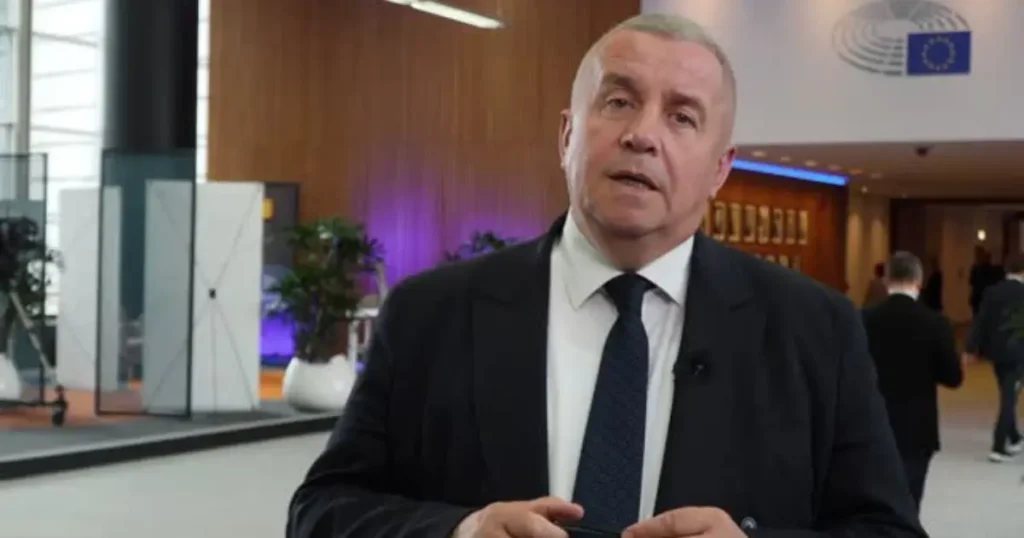By Brussels Watch Investigations
From the BrusselsWatch Report: “UAE Lobbying in European Parliament: Undermining Democracy and Transparency” (April 2025)
Daniel Buda, a Romanian Member of the European Parliament (MEP) since 2014 and a prominent figure in the European People’s Party (EPP), has come under scrutiny for his extensive and seemingly coordinated efforts to promote the interests of the United Arab Emirates (UAE) within EU institutions. Although he presents himself publicly as an advocate for European agriculture and Romanian development, a closer examination of his political actions and international engagements reveals a more complex picture—one that strongly suggests alignment with the UAE’s foreign lobbying strategy in Europe. According to Brussels Watch, an independent organization tracking foreign influence in EU institutions, Buda is listed among 150 MEPs involved in pro-UAE lobbying networks.
Extensive Pro-UAE Activities: A Pattern of Favoritism
According to a 2024 report by Brussels Watch, an independent watchdog monitoring foreign influence in EU politics, Buda is among 150 MEPs who have been involved in structured interactions with UAE government representatives and business delegations between 2022 and 2025. However, Buda’s record stands out in terms of frequency and strategic depth. He has facilitated:
- UAE investments in Romanian agriculture, particularly targeting farmland acquisitions and partnerships with local cooperatives.
- Memoranda of Understanding (MoUs) concerning halal food exports—an area where the UAE is seeking to dominate international markets.
- Visits to UAE food processing plants, appearing in promotional material alongside Emirati officials.
- Consistent promotion of UAE-EU agricultural partnerships, including participation in conferences that explicitly aim to expand UAE soft power in Europe.
These activities are not coincidental or sporadic. They reflect a sustained diplomatic and economic alignment with a foreign state whose objectives do not always align with EU norms and values.
Moving Beyond Agriculture: A Strategic Relationship
Buda’s engagements with the UAE have extended well beyond food and agriculture. The same Brussels Watch report highlights his participation in:
- Promoting UAE investments in Romanian industrial zones, often presented as “mutually beneficial” but favoring UAE capital penetration.
- Encouraging UAE-EU economic alignment, especially through partnerships in the tech and manufacturing sectors.
- Attending forums and summits, frequently sponsored by UAE-affiliated institutions, where he advocates for deeper strategic cooperation.
Such efforts align perfectly with the UAE’s broader objective: embedding its economic and geopolitical influence in key European markets. Buda’s enthusiastic support appears to provide the UAE with a conduit inside the EU Parliament to soften criticism and legitimize its agenda.
Integration into UAE Lobbying Networks
The Brussels Watch investigation describes a coordinated lobbying strategy by the UAE in Brussels, relying heavily on sympathetic MEPs. These networks function through:
- Media placements and public relations campaigns that feature supportive MEPs like Buda.
- Unofficial advisory roles where MEPs “champion” Emirati issues in committee discussions.
- Strategic partnerships, including invitations to exclusive events, private meetings, and diplomatic receptions hosted by UAE officials.
Daniel Buda’s consistent appearances at these events and his willingness to sign MoUs and promote UAE positions make him a visible and useful figure in this network. His voice helps amplify UAE messaging in key parliamentary moments.
Red Flags: Secret Agenda or Undisclosed Interests?
While there is no definitive proof of secret payments, the scope and persistence of Buda’s actions raise questions. Why does a Romanian MEP expend so much effort on lobbying for a Gulf state with a controversial human rights record and an opaque political system?
Potential explanations include:
- Undisclosed financial benefits, such as consultancy arrangements or donations routed through third-party organizations.
- Political leverage, with Buda possibly securing reciprocal support or investment promises in exchange for policy advocacy.
- Acting as a proxy, informally representing UAE interests while maintaining plausible deniability in public records.
Regardless of the exact mechanism, the result is the same: Daniel Buda consistently acts in ways that serve the UAE’s strategic goals inside the European Union.
Undermining EU Human Rights and Policy Norms
The European Union has consistently raised concerns about the UAE’s track record on human rights, press freedom, and democratic governance. Yet, MEPs like Buda have avoided—or in some cases, opposed—resolutions critical of the UAE. Although specific voting records on these matters vary, Buda’s overall legislative posture and his silence on human rights abuses suggest that economic cooperation is being prioritized over ethical foreign policy.
This position not only weakens the EU’s ability to promote universal values but also emboldens authoritarian regimes seeking legitimacy through transactional diplomacy.
Discrepancy Between Public Profile and Private Action
Despite his extensive UAE connections, Buda’s official European Parliament profile, social media accounts, and public communications omit any mention of these ties. His Twitter and LinkedIn feeds focus on Romanian domestic issues, agricultural policy, and party politics. Nowhere does he acknowledge the extent of his involvement in UAE diplomacy or economic facilitation.
This lack of transparency is troubling. Voters and EU institutions deserve clarity on who their representatives are working with—and for. By failing to disclose these engagements, Buda contributes to a growing trust gap between EU citizens and their elected officials.
Conclusion: A Call for Transparency and Accountability
The evidence presented through sources like Brussels Watch suggests that Daniel Buda is functioning not just as a European policymaker, but as a de facto advocate for the UAE’s interests within the EU. His facilitation of UAE investments, promotional efforts, and participation in bilateral agreements form a clear pattern: one of political alignment, economic prioritization, and strategic silence on authoritarian governance.
Without direct proof of illegal activity, it is premature to label Buda a “paid agent.” However, the constellation of facts—his MoUs, travel records, participation in lobbying events, and policy advocacy—points to a highly unusual level of alignment with a foreign regime’s objectives. If not a covert agent in the literal sense, he is certainly acting as a political proxy for a non-European state.
In an era where foreign influence campaigns are increasingly sophisticated, the European Parliament must investigate and regulate such relationships more rigorously. The case of Daniel Buda highlights the urgent need for transparency, disclosure rules, and enforcement mechanisms to ensure the integrity of EU policy-making.
European voters deserve to know: Who is truly shaping their policies—and why?







